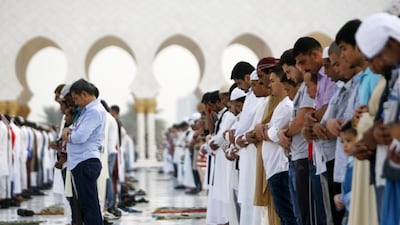This evening, Muslims around the world will be waiting with bated breath to find out if they will be able to confidently reach for a glass of water to sip on Friday morning or not.
The beginning of Eid Al Fitr in the UAE will be announced tonight after the moon-sighting committee convenes at the Abu Dhabi Judicial Department.
The meeting will be held under the chairmanship of Minister of Justice Sultan Al Badi, along with a number of senior officials.
The Islamic calendar is determined by moon phases making each month last either 29 or 30 days. Islamic years span on average between 354 and 355 days.
Should a crescent moon be spotted on tonight, Shawwal 1 will begin on Friday – signalling the first day of Eid Al Fitr. If a new moon is not seen by the committee, Friday will be assumed Ramadan 30 and Eid Al Fitr will begin on Saturday.
Two weeks ago, the International Astronomical Centre said Eid would most likely fall on Friday, June 15, in most Islamic countries. The official date is subject to the announcement from the moon-sighting committee.
_______________
Read more:
Eid Al Fitr holiday announcements for UAE public sector and private sector
Eid Al Fitr 2018: the 24 best things to do this weekend in the UAE
Savings of up to 90 per cent at huge 24-hour Eid sale coming to Abu Dhabi
_______________
A moon-sighting committee was formed before Ramadan this year. Among the committee members was Dr Ahmad Al Ahdal, senior preacher at Department of Islamic Affairs and Charitable Activities in Dubai, who explained the process of moon-sighting in an interview with Abu Dhabi TV.
He said some Islamic countries prefer to use telescopes to sight the moon, while other countries will only call Ramadan if the new moon is spotted with the naked eye.
Dr Al Ahdal said the UAE uses a mixture of traditional and modern methods by first using telescopes to try to spot the new moon, then, should a new moon be seen, increasing efforts to sight the crescent with the naked eye.
Historically, the UAE, Bahrain and Saudi Arabia tend to call Ramadan and Eid on the same days.
Eid Al Fitr celebrations begin with Eid prayers at fajr – or dawn. The prayers are always performed in a group and involve particular rituals and a sermon unique to other prayers practised by Muslims.
Muslims are advised to follow the tradition of Prophet Mohammed and bathe before Eid prayers, wearing perfume and new clothes. Muslims see the prayers as a chance to exchange Eid greetings and meet neighbours, family and friends.
Muslims then celebrate Eid Al Fitr for two or three days by visiting families and loved ones. More recently, it has also become common practice to use the Eid holiday to travel or carry out extracurricular activities.

